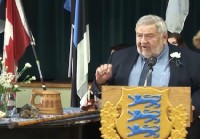Laas Leivat
Sirje Kiin, Ph.D. in literature, publicist, journalist, essayist, lecturer, hurtles full steam into the debate about the necessity for the Estonian language to be the lingua franca of scholarly discourse.
Recently Margus Niitsoo, a faculty member of Tartu University has publicly declared : „The faster that Estonian dies as an academic language, the better.” Niitsoo says that defending Estonian as an academic language from vanishing blockades the advancement of scholarship. Niitsoo is known as a productive, young scholar, already the recipient of numerous awards and the youngest Estonian to gain a doctorate.
Niitsoo doesn’t believe in the concept of a nation-state. He claims that Estonian-language education and Estonian scholarly language are not values in and of themselves, that have to be a priori defended. For Niitsoo, humanity as a distinct entity is of importance. Divisions within it and the promotion of one’s own language doesn’t favour a global society undivided. Giving a nation’s language precedence detracts from the ability to communicate to the world about one’s accomplishments because one has to learn everything in two languages, first in Estonian and then in English. Nitsoo insists that the sooner Estonian dies as an academic language, the better.
In addition Niitsoo says that use of Estonian in higher education and academia hinders the use of world class top foreign scholars who are recognized as better academics and also teachers. It’s also an obstacle for those who have achieved advance degrees abroad and who, upon returning must learn the language of academia all over again. (Pikemalt Eesti Elu 18. nov. lehest)

Estonian language – first or second class? Estonian Life (5)
Viimased kommentaarid
Kommentaarid on kirjutatud EWR lugejate poolt. Nende sisu ei pruugi ühtida EWR toimetuse seisukohtadega.
It would be tempting to dismiss young Dr. Niitsoo's comments as facile, irreverent or immature. He seems to be a bit of a child prodigy, but with perfectly commendable credentials, rooted in linguistics and developed in IT. We need to identify exactly what he is saying. He is not advocating the devaluation of the Estonian language, but simply commenting on the hurdles academics have in translating their work between English, the language of international academia, and Estonian, the language of the people of Estonia. Many necessary terms lack appropriate equivalents in both languages, and effort is required to round out the vocabulary, -- effort that I suspect Niitsoo would prefer to have devoted to the academic task. This is an unfortunate consequence, but a necessary one. Academics need advanced capability in multiple languages. Even the Russian-speaking ones in Estonia need to develop proficiency in the language of the land.
When Israel ceases to be a nation-state and abandons Hebrew and Yiddish languages -- only then should Estonia start debate about following suit.
Let's have a look at Prof. Niitsoo's English, to see if it's comprehensible to native speakers.
That of many of his colleagues certainly isn't, even though they'd arrogantly beg to differ.
That of many of his colleagues certainly isn't, even though they'd arrogantly beg to differ.
Arvamus
TRENDING

























